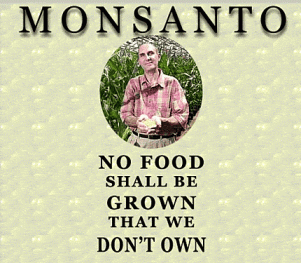First, Monsanto wins landmark case in Supreme Court gives the overview.
On Monday, the US Supreme Court ruled in favor of the bio-tech giant Monsanto. In the case, Indiana farmer Vernon Bowman was being accused of seed infringement after he allegedly planted soybean seed without the company's permission. RT's Liz Wahl brings us more on the landmark case and how the 75 year-old man violated Monsanto's patent.I had no idea about the inflation in seed prices until I watched this video.
Next, RT America offers one of its trademark opinion and analysis pieces with inflammatory titles in Monsanto taking over America's agriculture: New victory in Supreme Court.
A battle between Monsanto and an Indiana farmer ended on Monday after the Supreme Court found Vernon Bowman guilty of patent infringement. The 75-year-old farmer is expected to pay approximately $85,000 in damages. Many see this as a major blow against smaller farmers across the country and fear this ruling can threaten the livelihood of thousands of farmers. Patent attorney Mark Walters, who represented the defendant, joins us to discuss the details of the case and what this means for America's agriculture future.This case is important because it shows that Monsanto will continue to be as dominant in the nation's food supply as Microsoft was in PC operating systems, as characterized in the movie "Food, Inc." That makes this case relevant to my class, especially the following questions from the worksheet I included in On Thanksgiving eve, I present "Food, Inc."
26. What has Monsanto done to promote use of their soybeans and stop seed saving? List at least three examples.Part of the answer to 26 is sue people who violate Monsanto's patents. One of the people who traveled through the revolving door between Monsanto and the government is Supreme Court Justice Clarence Thomas, who wrote the decision allowing Monsanto to patent GMOs. It looks like the rest of the court went along with his precedent.
27. List at least five government officials who were connected to Monsanto and other food producers. What effect does the narrator think this has had on regulation of food production?
This won't be the only Supreme Court case involving biotechnology. Discovery News on YouTube discusses another in Gene Patents: 5 Things You Should Know.
The debate over whether we can patent genes has come to a head with the US Supreme Court weighing in on two human genes linked to cancer. Laci has all the details on what you need to know about this colossal decision and the impact it could have on medicine.Based on the Monsanto decision, I expect the court to rule in favor of patenting human genes, too. Either way, it's more evidence that we live in science fiction times.

No comments:
Post a Comment